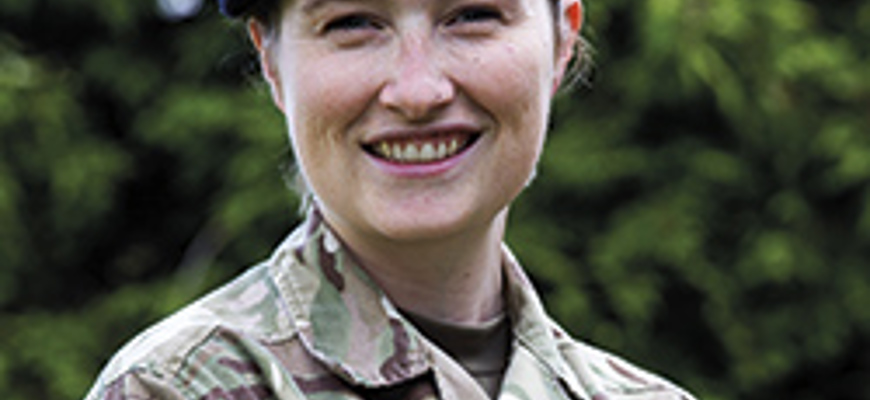Law under orders

Where do you come from, and what has been your career path?
I am from Aberdeen. I did not start out planning to join the Army. In fact, I was completely unaware until 2014 that the Army had lawyers.
I am from a family of lawyers, and years of dinner table discussions inspired me to pursue the same field. My first-class honours LLB with European Legal Studies at Aberdeen University included an Erasmus year in Finland, focusing on European and international law. The opportunity to work in public international law was one of the appeals of the Army Legal Services (ALS).
I trained at Simpson & Marwick in Edinburgh and then practised there for some years, mainly in professional indemnity and medical regulation. I really enjoyed the work and the fantastic team I worked with.
My venture into the Army was unexpected. I happened to notice an advert that said something like “If you are interested in legal challenges, enjoy fitness and travel then this is the career for you”. This instantly appealed, although I had no idea whether I would be suited to the Army lifestyle.
My folks instantly told me to go for it, and against my own expectations I made it through the rigorous recruitment process, which included a legal interview, medical and fitness tests, and finally the Army Officers Selection Board. By that stage I was certain this was too good an opportunity to miss. I commissioned as a captain in January 2015.
As a legal officer, you first spend around nine months training. This includes legal training, the 12-week Professionally Qualified Officers’ course at the Royal Military Academy Sandhurst (RMAS), and three months on combat arm attachment with an infantry unit. This was where I could put into practice what I learned at RMAS. I had the pleasure of joining 1 Royal Gurkha Rifles based in Brunei.
My first posting was at Army Legal Assistance (ALA) in Germany where I spent a great 10 months. I am currently based in West London at the Service Prosecuting Authority, and although it’s early days I already feel part of the team. I am still learning, but so far it seems to be full of the challenges and rewards you would expect from any court based legal role.
How is your in-house legal team structured?
ALS is a specialist all-officer branch of the Adjutant General Corps. It comprises professionally qualified solicitors, barristers and advocates from across the UK. The Director General (DGALS) is Major General Susan Ridge, assisted by two brigadiers who head Legal Advisory and Operational Law. The remaining 110 or so ALS officers rank from captain to colonel.
There are three principal areas of expertise:
- Legal Advisory – advises the chain of command (CoC) on all aspects of military and administrative law, including disciplinary matters;
- Service Prosecuting Authority – a tri-service (Navy, Army and RAF) organisation, independent from the CoC, responsible for reviewing cases referred from the CoC or Service police and, where appropriate, prosecuting at Court Martial or in the Service Civilian Court;
- Operational Law – responsible for training units and individuals regarding operational law prior to all operational deployments and throughout their careers; also assists develop future doctrine.
Captains usually move between postings every two years or so to cover the principal areas of practice. This gives us a sound basis in all areas before moving on to more specialist roles if and when we promote to major.
What is a typical working day?
I have been in the Army for around 20 months and every day varies. Often a legal officer will have a caseload like any civilian lawyer. One difference is that we intersperse our days with fitness. We are required to meet the same fitness levels as other Army officers and to pass the same biannual fitness test.
My typical working day depends on the posting. At the moment, I usually go for a run before work and to the gym at lunchtime but otherwise spend the day on case files or at hearings at one of the Military Court centres located around the country. At ALA in Germany, I was more like a high street lawyer, meeting with clients and dealing with their issues, which tended to relate to family or small claims matters.
What motivates you on a Monday morning?
Interest in my work and really friendly colleagues! I never have any concerns about going into work because I know that if I am faced with challenges, the team around me will provide the support and guidance needed to succeed.
What was the biggest change when you moved in-house?
From a professional standpoint, the biggest change was going from being a specialist and relatively experienced lawyer to learning and operating in new and challenging areas.
Personally, it was a big change moving away from Edinburgh and my legal “family”. However, living in the officers’ mess and moving wherever the Army sends me is all part of the experience. I have adapted well and really enjoy the team spirit of the Armed Forces.
Has your organisation experienced any major change recently?
We were very proud to welcome our new DGALS in September 2015. Major General Susan Ridge is the highest ranking female in the British Army, not just ALS, which highlights that the Army is an organisation in which women can progress. There have also been developments in flexible and part time working: the highest levels of the CoC are attuned to the changing views of society and the need for a good work-life balance.
What is your most unusual/amusing work experience?
As a lawyer in my 30s, I did not expect that part of my role would involve navigating through training fields of mud or learning how to fire a rifle. However, I certainly enjoyed the challenge of RMAS. It was one of the hardest things I have done, but I look back on that time with fondness. I should emphasise that this is not part of my day-to-day job!
This training gave me basic military skills as well as an insight into the ethos of the military. This has been of enormous benefit in my subsequent postings.
What makes a good in-house lawyer? What’s your career advice for young lawyers who want to start an in-house career?
I have a suspicion that a career in ALS is different from most in-house roles! For ALS, I would say that you need all the skills of a lawyer in private practice, plus the leadership qualities necessary to be a British Army officer. It also helps to have a drive for adventure and a willingness to operate outside your comfort zone. It is not a nine-to-five job. However, the benefits are substantial.
Anyone interested in joining should look at the ALS page on the British Army website. This provides details of insight visits where interested applicants can come and hear about what we do before applying.
My advice – do it! It was a step away from my mainstream legal career but I don’t regret it. There is plenty of scope for professional and personal development and it allows me to make a wider contribution to society than I ever would have in private practice.
What are the current hot legal topics in your sector? How does the future look?
In ALS, we need to keep up to date with and adapt to changes in the law at home and abroad. From an operational standpoint, international rules on armed conflict and humanitarian law are constantly evolving. In an advisory context, we need to ensure the standards expected within the Army are upheld; changes in civilian employment law also require to be reflected within our practices. The Service Prosecuting Authority needs to keep up to date and, in some cases, pioneer working practices to ensure we operate in line with the Crown Prosecution Service.
There is ever growing recognition of the contribution of ALS officers. This has resulted in growth in the variety of fascinating and challenging roles available to us. In my view, our future is bright.
Does Scottish legal education and training provide the necessary skills for working in-house in your organisation?
Yes. In my experience, Scottish legal education is held in very high esteem. There are highly experienced Scottish lawyers throughout the ALS CoC. We predominantly operate under the law of England & Wales, but there is no distinction between the jurisdictions when it comes to legal officers.
I have been able to use my Scottish training in a worldwide context. I used my civilian experience with clients when advising soldiers in Germany, and I am hoping the advocacy skills I developed will hold me in good stead in the Service Prosecuting Authority. However, the breadth of work also provides the chance to develop my legal skills more generally. ALS are very proactive about training and regularly provide opportunities for courses in the UK and abroad.
How do you think in-house lawyers today are perceived within the legal profession?
Historically, I think there was a general view that private practice was the best place to further your career. However, there is now more appreciation of in-house work. Specialism has become the norm. There is a growing recognition that in-house lawyers are specialists in their field and tend to have a better work-life balance than those in private practice.
How can the In-house Lawyers’ Committee best represent the interests of in-house lawyers in your industry?
It can raise awareness of the opportunities open to Scottish qualified lawyers. It would be terrible if there were those out there who would love this job and simply do not know it exists. The opportunity should be presented as one of many open to those wishing to move into the in-house or public sectors.
What keeps you busy outside the office?
I really enjoy outdoor activities. I will try most sports (with varying degrees of success), but my main interests are running, cycling, climbing and skiing.
I also try to take advantage of the opportunities presented by my postings. I have spent weekends travelling around South-East Asia and Germany. I am now taking the opportunity to explore London.
What would you take with you to a desert island? What would you put in Room 101?
I immediately thought of practicalities like food and drinkable water but, assuming this is a relaxing desert island and those are supplied, a Kindle with lots of books! Bad manners for Room 101. The words “please” and “thank you” cost nothing.
In this issue
- Legal protection of adults – an international comparison
- The UPC post-Brexit: unified, “emmental-ed”, or dead?
- Proof of purpose: IHT and APR
- Bankruptcy consolidated: what do I need to know?
- Dividends – compliant but challengeable?
- FGM mandatory reporting: an example to follow?
- Reading for pleasure
- Opinion: Neil Hay
- Book reviews
- Profile
- President's column
- Next pieces of the jigsaw
- People on the move
- Beginner's guide
- As simple as that?
- Excellence in action
- "That is not how we do it here"
- Rebranding in the digital age
- Brexit: Brussels in a holding pattern
- Common areas: keep Pandora's box shut
- Police: qualified experts?
- Is that overprovision policy watertight?
- Impact assessments still important
- The vital paper trail
- Scottish Solicitors' Discipline Tribunal
- Controlling interests: problem questions
- Law under orders
- Prisoner correspondence: a reminder
- Law reform roundup
- Society, Parliament revamp law student competition
- Foundation for aspiration
- Payment fraud: take five
- Ask Ash
- Better together?
- Paralegal pointers






